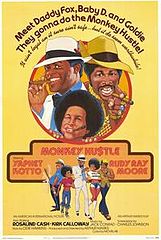
I first saw Monkey Hustle at the 2004 B-Fest and I enjoyed more than any other blaxploitation film I’ve seen since, there or elsewhere. It holds a 4.8 on IMDb as of writing and was panned on its release. I’m here to tell you that it’s a good film and the critics be damned.
In a nutshell, Monkey Hustle is about various characters in a Chicago neighborhood, their interactions, and the looming threat of a new expressway (tapping in to the freeway revolts of the 1960s and 1970s). Monkey Hustle’s detractors argue that the plot, such as it is, doesn’t hang together and that most of the scenes don’t relate to each other and make little sense. This is all nonsense. What we’ve got here is a film loaded with subtext, with characters who don’t know they’re in a movie and don’t feel a need to explain themselves.
Look at Daddy Fox (Yaphet Kotto) and Goldie (Rudy Ray Moore). No one tells the audience that, though rivals, they go way back and that Fox has some kind of claim over Goldie. We get that from their interactions. In the climax of the film Fox and Goldie use their connections to divert the neighborhood-threatening expressway. A lesser film would have told us some pointless story about how Goldie saved the alderman’s life (alluded to) or how the alderman owed Fox some favor. In the Monkey Hustle, it’s sufficient that they exercised their influence. Look at the melancholy expression on Goldie’s face at the block party–it cost him something to make this happen.
Much of the film is taken up with the small change of neighborhood life. Characters move in and out; threads are begun and abandoned. One critic leveled the charge that no one in the Monkey Hustle grows as a character. I’m not sure that’s true (the relationship between Win and Vi is one example), but let’s address that head-on. It’s less than a week in the life of a Chicago neighborhood. How realistic would it be for any of the characters, let alone a preponderance, to grow in that span, and to also reflect on it for our benefit? The older characters (Fox, Goldie, the Black Knight, Mr. Molet) are set in their ways–they aren’t going to change. Fox even says as much to Goldie, who upbraids him for refusing to get out of the small-time hustle (“Foxy, you’re my main man! You’re my main man!”)
The film was shot entirely in Chicago’s South Side in the mid-1970s and looks it. Several scenes take place in the now-demolished LaSalle Street Station. Along with The Sting (1973), it has to be one of the last films ever shot there, and possibly the only one in a contemporary setting. This also introduces a small goof when the band returns at the start of the film from a long tour by way of LaSalle Street, which by then handled only commuter traffic and the two remaining long-distance trains of the Rock Island. I hope the band enjoyed the Quad Cities and Peoria because that’s as far as they got.
There are problems, no doubt. Whatever the subtleties of the relationship between Fox, Goldie and the alderman Chicago’s politics did not and do not work that way, a point that Chicagoan Roger Ebert made in his own review (he panned it as well, while noting it did good business). I don’t see this as a major problem. Monkey Hustle is a slice-of-life feature; while a major event in the neighborhood is the expressway it is not the only event and does not upstage everything. We see a proto-community organizer several times; perhaps he had some successes of his own. A lesser film would give him a scene with someone as the film is wrapping up in which he discusses his victory, ignoring that in real life we don’t always get to champion our successes as they happen.
It’s an enjoyable flick and much better than its reputation. Go watch it on Netflix and see what you think.